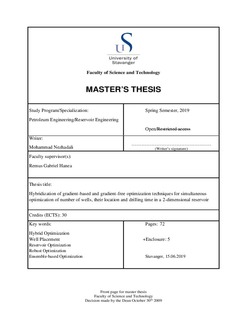| dc.contributor.advisor | Hanea, Remus Gabriel | |
| dc.contributor.author | Nezhadali, Mohammad | |
| dc.date.accessioned | 2019-10-02T08:37:08Z | |
| dc.date.available | 2019-10-02T08:37:08Z | |
| dc.date.issued | 2019-06 | |
| dc.identifier.uri | http://hdl.handle.net/11250/2619791 | |
| dc.description | Master's thesis in Petroleum Engineering | nb_NO |
| dc.description.abstract | Optimization has always been a challenging scope in any field of science, and reservoir management is no exception. By the advent of computational power, the use of mathematical algorithms in conjunction with reservoir simulators has prospered drastically. These mathematical optimization algorithms are divided into two main categories, namely gradient-based algorithms and gradient-free algorithms.
The optimization in petroleum industry is mostly focused on maximization of the Net Present Value (NPV) of the project. Utilization of gradient-based optimization techniques for this aim, even though being popular, has some limitations including risk of convergence to local optima and difficulties in optimizing discrete and categorical variables such as well path and well locations. On the other hand, gradient-free optimization techniques, which mostly rely on probabilistic and stochastic principles, have their own limitations.
This study shows that hybridization of the gradient-free and gradient-based optimization techniques has a good potential to result in a robust reservoir optimization scheme which outperforms both gradient-free and gradient-based optimizers separately. In doing so, a serial optimization algorithm is devised by hybridization of genetic algorithm, simulated annealing, and stochastic gradient descent method. Employing this algorithm in several optimization problems in a two-dimensional oil field, has proved that this algorithm outperforms its previous forerunners in optimization of the number of wells in the field, their location, and drilling schedule.
Findings of this study can be used to raise a foundation for generation of new optimization techniques which can boost the standards in both the complexity of problems solved in petroleum industry and their computational efficiency. | nb_NO |
| dc.language.iso | eng | nb_NO |
| dc.publisher | University of Stavanger, Norway | nb_NO |
| dc.relation.ispartofseries | Masteroppgave/UIS-TN-IER/2019; | |
| dc.subject | petroleumsteknologi | nb_NO |
| dc.subject | petroleum engineering | nb_NO |
| dc.subject | hybrid optimization | nb_NO |
| dc.subject | well placement | nb_NO |
| dc.subject | robust optimization | nb_NO |
| dc.subject | reservoir optimization | nb_NO |
| dc.subject | ensemble-based optimization | nb_NO |
| dc.subject | reservoarteknologi | nb_NO |
| dc.subject | reservoir engineering | nb_NO |
| dc.title | Hybridization of gradient-based and gradient-free optimization techniques for simultaneous optimization of number of wells, their location and drilling time in a 2-dimensional reservoir | nb_NO |
| dc.type | Master thesis | nb_NO |
| dc.subject.nsi | VDP::Technology: 500::Rock and petroleum disciplines: 510::Petroleum engineering: 512 | nb_NO |
